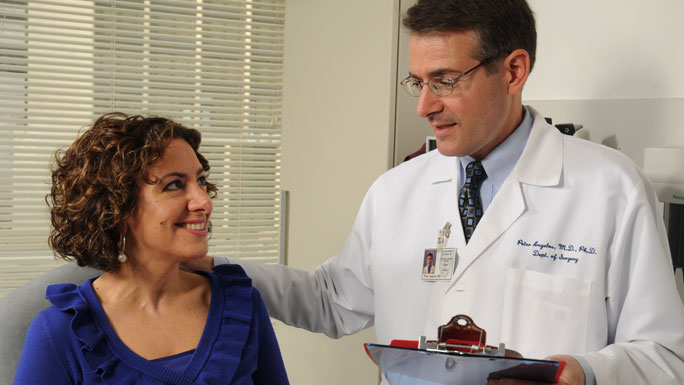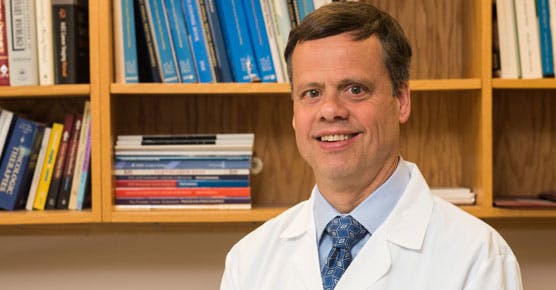Thyroid Cancer

Most thyroid cancers grow slowly and are curable. But sometimes these cancers can be difficult to treat or recur after initial treatment.
The best defense patients have against thyroid cancer is a knowledgeable team of medical and surgical experts who collaborate and share their knowledge. At the University of Chicago Medicine, our endocrinologists, endocrine surgeons, head and neck surgeons, medical oncologists and radiation oncologists meet regularly to discuss patient cases and to determine the best treatment options.
This approach is particularly vital for adults and children with rare and hard-to-treat thyroid cancers. Few surgeons or endocrinologists in the Midwest have as much experience treating thyroid cancer — particularly complex cases — as our physicians. We work closely with pediatric endocrinologists at UChicago Medicine’s Comer Children’s Hospital. UChicago Medicine endocrine surgeon Peter Angelos, MD, helped develop the pediatric thyroid cancer guidelines for the American Thyroid Association.
Because our physicians are also researchers, they are dedicated to testing promising treatments for our patients via clinical trials, including new targeted drug therapies and immunotherapy for aggressive thyroid cancers.
Types of Thyroid Cancer
The thyroid is a butterfly-shaped gland in the neck. When a nodule, or growth, develops on the thyroid, UChicago Medicine endocrinologists order various tests, such as an ultrasounds and biopsies, to determine whether the growth is cancerous.
Most thyroid nodules are benign. When cancer is present, our pathologists examine the tumor cells under a microscope to determine the specific type of thyroid cancer, which helps guide treatment. Types of thyroid cancer include the following:
Differentiated thyroid cancer: Typically slow-growing, these cancers develop from follicular cells in the thyroid and include a number of subtypes:
- Papillary cancer: Most thyroid cancers are papillary tumors, which are highly curable. However, some rare subtypes of papillary cancer — columnar, diffuse sclerosing, insular and tall cell — can be challenging to treat.
- Follicular cancer: Approximately 10 percent of thyroid cancers are follicular tumors, which typically respond well to standard treatments.
- Hurthle cell cancer: A relatively rare type of thyroid cancer, Hurthle cell cancers can be aggressive and spread to other parts of the body.
Medullary thyroid cancer: Approximately 4 percent of thyroid tumors are medullary cancers, which develop in C cells (neuroendocrine cells). This type of thyroid cancer can be more challenging to treat than differentiated thyroid cancer. Some people inherit a genetic propensity to develop medullary thyroid cancer. At UChicago Medicine, we offer a neuroendocrine tumor program that brings together experts from several areas who offer special expertise in treating neuroendocrine tumors.
Anaplastic, or undifferentiated, thyroid cancer: A rare type of thyroid cancer, anaplastic tumors tend to grow fast and are difficult to treat. When patients are diagnosed with this type of cancer, they are seen quickly by our ear, nose and throat specialists to ensure the tumor will not block the airway as it expands.
Treatment for Thyroid Cancer
The first line of treatment for most thyroid cancers is surgery to remove the tumor and possibly some or all of the thyroid gland. The lymph nodes in the neck will also be removed if cancer has spread beyond the thyroid.
Our surgeons are experts in minimally invasive approaches for thyroid operations, which help reduce recovery time and scarring. We tailor our surgical approach depending on the patient’s tumor, but aim to use the fewest and smallest incisions possible.
When a patient’s tumor cannot be completely removed via surgery, or has spread to the lymph nodes, our endocrinologists may recommend a medication taken by mouth called radioactive iodine (RAI). Radioactive iodine destroys cancerous thyroid cells while minimizing harm elsewhere in the body.
If thyroid cancer recurs or cannot be successfully treated with surgery and RAI, our medical oncologists and radiation oncologists may recommend chemotherapy and/or external radiation therapy. We also offer novel treatments via clinical trials for hard-to-treat thyroid cancer that are not commonly available elsewhere:
- Targeted drug therapies: These medications are designed to attack specific molecular markers on cancer cells and leave healthy cells alone, meaning fewer side effects than traditional chemotherapy.
- Immunotherapy: While not yet approved by the Federal Drug Administration for thyroid cancer, immunotherapy offers hope for patients with anaplastic and other aggressive thyroid cancers. Our physician-scientists are testing a combination of immunotherapy and traditional chemotherapy in a clinical trial.

Cancer Care Second Opinions
Request a second opinion with a UChicago Medicine urologic cancer expert.

Participate in a Clinical Trial
We're actively conducting clinical trials for thyroid cancer.

Diagnosis & Treatment of Endocrine Diseases
Our team can treat a wide range of endocrine conditions, from common diseases like diabetes to rare genetic disorders.
